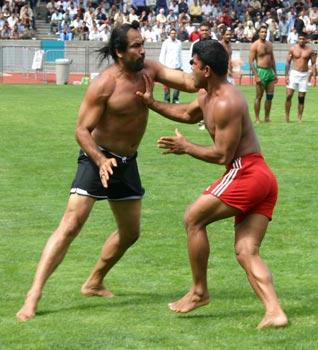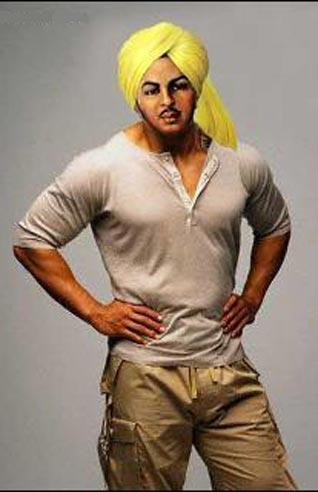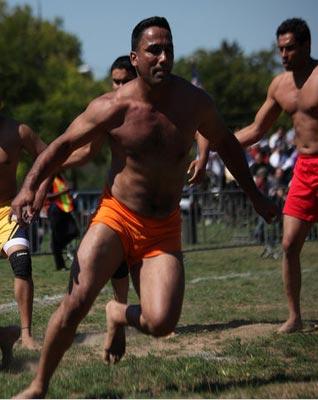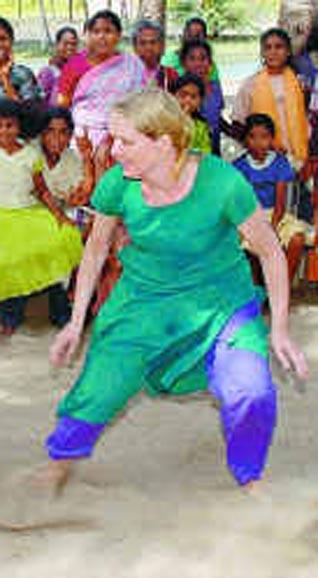Sports
Rough and Tumble:
A Game Called Kabbadi
by MICK MEENAN
The shirtless men circled and lunged at each other under the bright sun as the crowds watched, rapt, from the sidelines. One combatant, his head lowered like a bull ready to gore, chose an opponent to tag, only to suddenly find himself trapped in an upside-down bear hug and being shaken like a stubborn ketchup bottle as a referee's whistle blasted.
England had just been awarded a point over Canada West.
Successive waves of immigrants have woven ethnic sports like hurling, bocce and cricket into the New York fabric.
On Sunday, Cunningham Park in Queens became an arena for kabbadi, a traditional Punjabi competition, which perhaps could be thought of as a combination of rugby and wrestling - without the ball and the protective gear - with a helping of the old New York street game ringalevio thrown in.
The rules are simple enough, but winning a kabbadi match is tricky - and often painful. The eight-member teams on Sunday fielded four raiders and four stoppers inside a big circle 140 feet in diameter bisected midway by a white line.
The raiders invade their enemies' half of the field and try to make it back home safely. Stoppers relish the opportunity to corner and pummel the interlopers.
As the defending teams linked forearms and formed a protective semicircle, single raiders crossed the line between two orange sandbags spaced about 10 feet apart. The raider must be able to touch a stopper and escape between the sandbags to earn his team a point within 30 seconds.
Incursions by raiders rarely went unpunished on Sunday.
In the first match, between England and Canada West, a raider typically crossed into enemy territory only to be lured deeper into danger.
As traditional double-headed snare drums, known as dhols, sounded a martial beat, it was easy to imagine the game's originating in war, but an organizer of Sunday's event traced the roots of kabbadi to more benign beginnings in the Punjab, a region which constitutes the historical home of the Sikhs and straddles Northwest India and Pakistan.
"In the rainy season, in the villages, 4 or 10 people or whatever get together to have fun after the crops are in when they have time on their hands," said Lehmber Singh Kang, an official with the England team. "It is a game you start playing as a little child."
One spectator, Pawan Singh, 18, of Long Island City, Queens, explained that "you can do anything to stop them - grab them, jump him, slam him."
"The skinny guys use their legs to whip them out and knock him down," Pawan Singh said.
There was nothing skinny, however, about the men who took the field for Sunday's opening matches. (Women played in a later match.) The men were barefoot and in shorts, their well-muscled torsos shaved and glistening with oil that flashed brute power as well as the ability to slip from an opponent's grasp.
Grapplers separated amicably enough following most stops, with hearty slaps on the back. Other times, the referees needed to intervene and end vicious swirls of face slapping, shoving and snarling on the center line.
The fearsome stopper for the England team, a native Indian who now lives in Gravesend, England, wore his hair in a sharp Mohawk and his dark black beard cleaved with deep lines.
In the victors' tent, after his team's triumph in the first match, he sheepishly waved off questions with a shy smile. The team's assistant manager, Steve Singh Basi, 33, identified him only as Tao.
"He doesn't speak English too well," Steve Singh said. "He doesn't need a last name. And he's done his job so far."
Hundreds of spectators crowded the bleachers or stood to watch the nine-match tournament pitting teams from as far away as Australia against athletes from Canada and the United States.
"Where [Sikhs] go, kabbadi follows," Lehmber Singh said.
The crowd seemed subdued - at least compared with fans of American sports - and there was little shouting or cheering. Typically, many devotees are Sikhs, and the crowd on Sunday included many men with beards and Sikh turbans. Women sat in separate bleachers, many under umbrellas as shields against the sunny heat.
Yet in keeping with the sport's international appeal, Sunday's competitors also included a London team of white blond women and an Australian crew with two African-American men from California, one of whom described himself as a mercenary of sorts.
That man, Larry Johnson, 32, a muscular 205-pound former college wrestler who stood just shy of 6 feet, said with a chuckle: "Why I'm here? It's not just recreational. I got kids, and Los Angeles is a long way from here."
Johnson, a real estate agent, said that he had been introduced to kabbadi by Sikh-American classmates at Dickinson State University in North Dakota and that he stood to win $2,500 by turning in a good performance.
England and Canada West met again in the final, which England won.
[Courtesy: New York Times]
September 20, 2010
Conversation about this article
1: Gur Singh (Chicago, Illinois, U.S.A.), September 20, 2010, 9:52 PM.
The Punjabi movie "Kabaddi - Ik Mohabbat" is getting premiered on Oct 1, 2010. I feel that it would be a must-watch, considering the fact that the quality of Punjabi movies has gone up in an exponential manner. May I request sikhchic.com to support the Punjabi language by adding a section called "Punjollywood" which should be entirely dedicated to the cause of Punjabi language and should carry frequent reviews on works related to Punjabi cinema, newly released music videos, Punjabi dramas, etc., without bias against the affiliations of the people who are working for keeping Punjabi alive. Please find some Punjabi lover critic who can call a spade a spade. We need to realize that it was the blood of uprooted Punjabis like Mohammed Rafi, the Kapoors, the Deols, Gulzar, etc. who have built Bollywood out of the experience of their ancestors from pre-Partition Lahore's rich cultural scene.
2: Sangat Singh (Kuala Lumpur, Malaysia), September 22, 2010, 7:51 AM.
Thanks, Gur Singh ji, I too have nursed this idea. What can be written in Punjabi cannot be faithfully translated into Punjabi. Most us can read and speak fluently but do not have the necessary skill to write as well. If this idea was to be instigated, then I suppose some provision would have to be made to type in Punjabi and/or to intersperse with English the way we normally speak. APNA does that. But I am not sure if one could comment in Punjabi, as I have never tried.
3: Gur Singh (Chicago, Illinois, U.S.A.), September 22, 2010, 3:01 PM.
S. Sangat Singh ji: I think the resources are there, they just need to be mobilized. But maybe some extra-money and planning can help as well. Sikhiwiki is a good example of how English can be kept at the forefront and by using google translation tools, sikhchic.com can cater to readers of other populations. Gurmukhi script is missing in among the list of possible translations there too. It hurts a bit, but being a optimist, I keep my spirits high. Also, login option can be used by sikhchic.com for its users rather than asking the people giving comments to type in e-mails again and again. It gives a sense of belonging and some extra ease. Plus, we never get any webmail from sikhchic.com. It might sound good that sikhchic.com does not spam, but on the other hand it misses the opportunity to reach the lazy masses who might benefit well with a once a day/ week/ month (depending on personal choice) newsletters, telling what's new going in the Sikh cyberspace.






